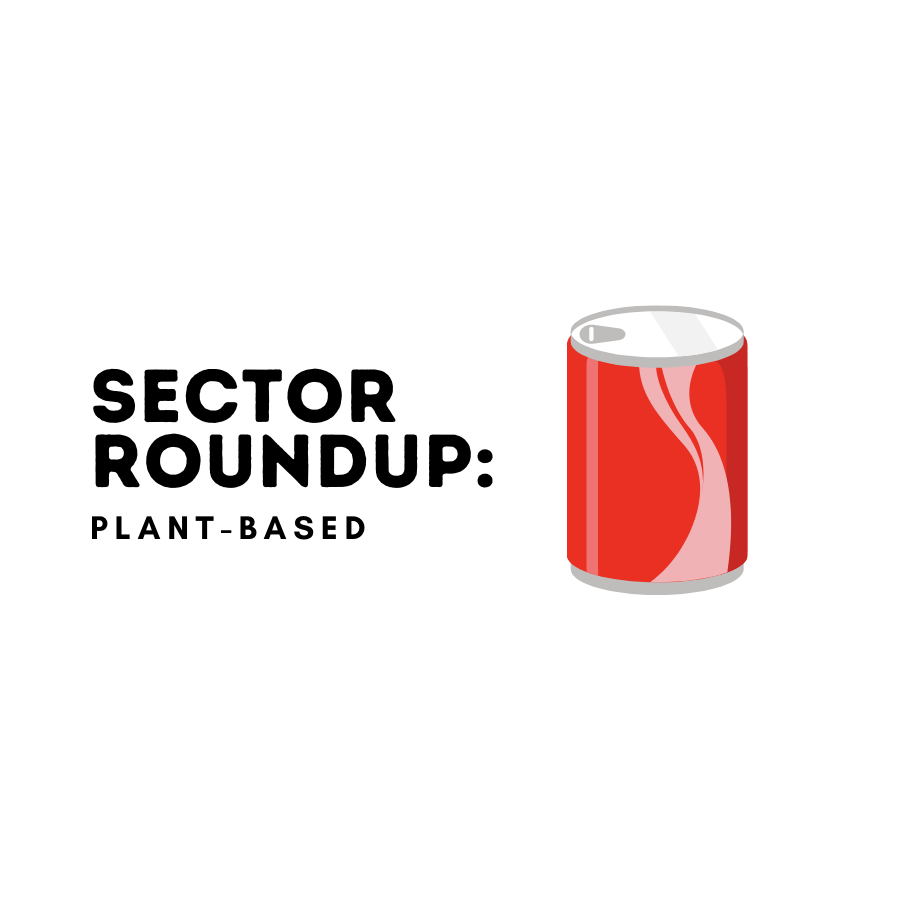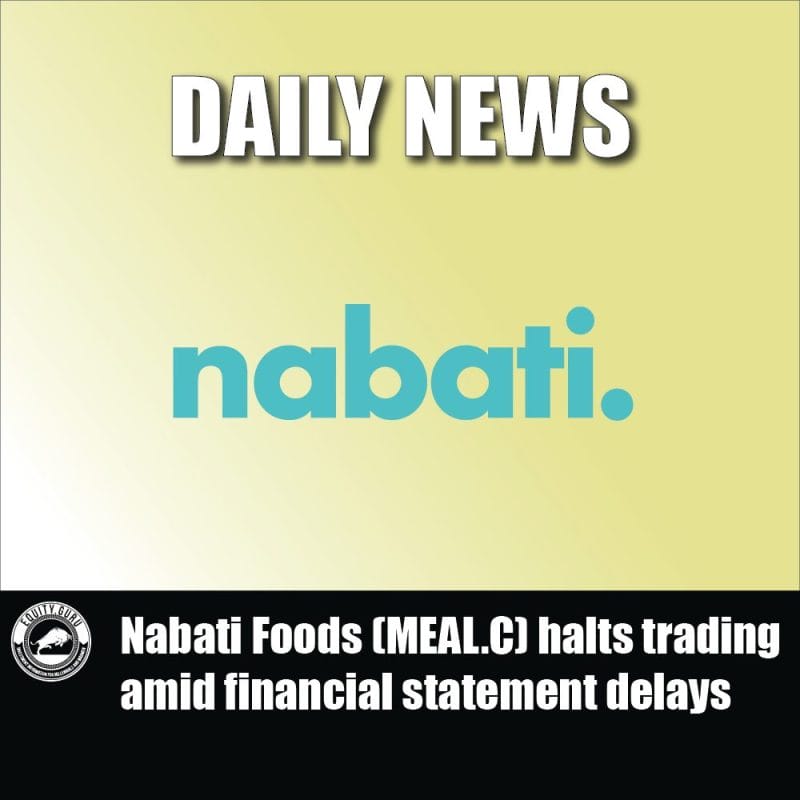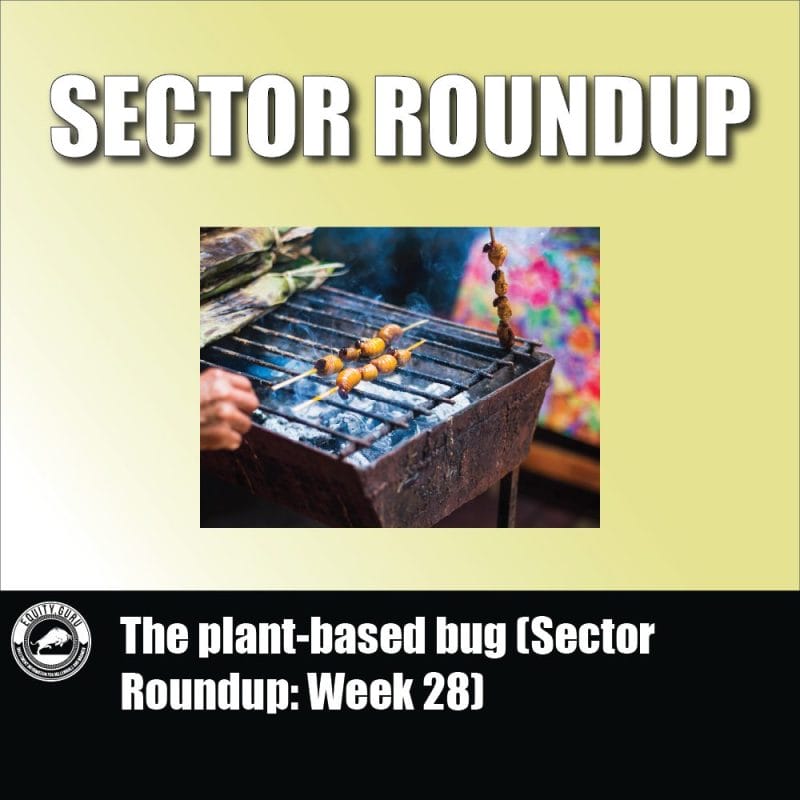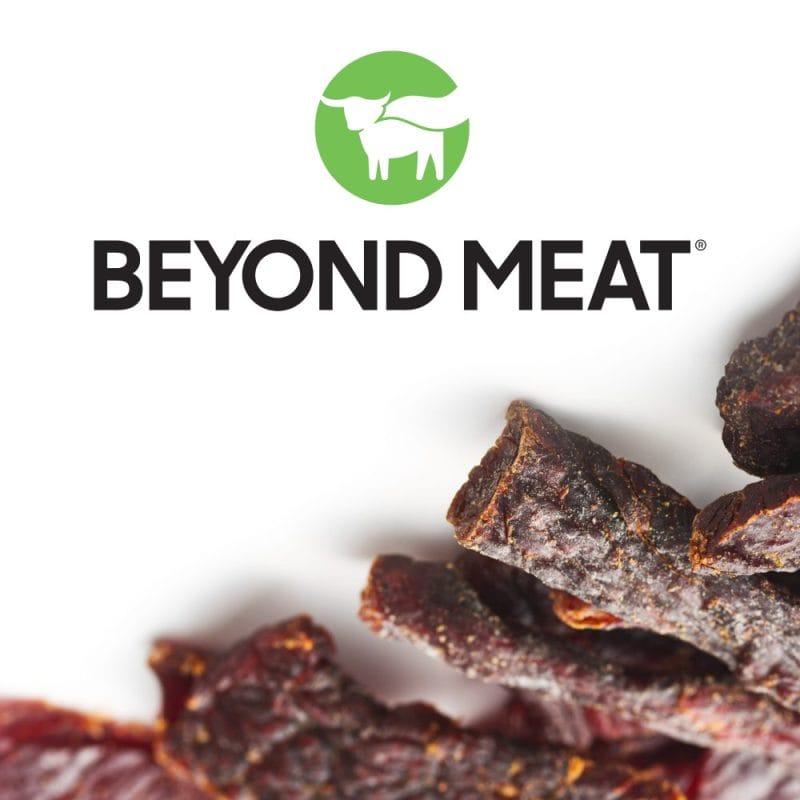Week in Review (Week 12)
Can you believe that I have been writing a plant-based sector roundup for 12 weeks in a row now? Neither can I. In the few months that I have spent covering the plant-based sector, a lot has changed. From my own observations, there has been a noticeable increase in the number of people who are interested in meat alternative companies like Beyond Meat or Impossible Foods. If my word isn’t good enough, Prescient & Strategic Intelligence estimates that the Global Plant-Based Protein Market generated $11,104.3 million in revenue in 2020. Moreover, this market is expected to grow at a compound annual growth rate (CAGR) of 9.2% between 2020 and 2030.
Furthermore, the Plant-Based Food Association (PBFA) and the Good Food Institute (GFI) recorded a 27% increase in the retail sales of plant-based food products in the United States (US) in 2020. Consumers aside, a study conducted by Atura Proteins revealed that of 102 UK-based food and drink professionals, 56% said they were likely to invest in plant-based products in 2022, specifically vegan meats. With how rapidly the sector is growing, I can understand why food and drink manufacturers would want to dip their toes in the lucrative plant-based market. So, what about consumers?
This is just personal speculation, but I believe celebrity influence plays a substantial role in motivating consumers to at least attempt a plant-based lifestyle. In fact, a study conducted by the University of Arkansas found that consumers ages 18-24 took on an active role in developing their identities based upon celebrities, demonstrating that they were more susceptible to brand endorsement than other age groups. In particular, research by Nielsen conducted in 2015 found that celebrity endorsements resonated more strongly with Generation Z and Millennial audiences. At the end of the day, can any of us really deny that we have been influenced by a celebrity in our past?
In the last few months, notable actors such as Ashton Kutcher, Mila Kunis, Woody Harrelson, Owen Wilson, Joaquin Phoenix, and Rooney Mara have stepped up to advocate for a plant-based lifestyle. Most recently, on October 30, 2021, Joaquin Pheonix and Rooney Mara spoke out about the environmental destruction linked to animal agriculture during the Countdown Global Livestream. During the Livestream, Mara commented, “there are so many decisions that are made that are outside of our control, that affect our lives and the planet. But this is one thing that we do have control over that we know will make a difference.” So, what’s my point? If Joaquin Pheonix asked me to jump off a bridge, I would do it. Yes, I am easily influenced by the people I admire, but the same can be said for a vast majority of consumers in my generation and the generation below me.
As we continue to push towards a more environmentally sustainable future, companies like The Coca-Cola Company (KO.NYSE) have begun making the switch to plant-based. On the other hand, Beyond Meat (BYND.Q), a pioneer of the sector, has felt the heat of competition as the market becomes saturated with new plant-based companies. On a smaller scale, companies like Nabati Foods Global Inc. (MEAL.C) and Plant Veda Foods Ltd. (MILK.C) are also doing their part to promote a shift towards plant-based. Let’s get into it.
The Coca-Cola Company

- $243.529B Market Capitalization
The Coca-Cola Company (KO.NYSE) is a multinational beverage corporation that has interests in the manufacturing, retailing, and marketing, of non-alcoholic beverages, concentrates, syrups, and alcoholic beverages. Come on, we all know who Cola-Cola is! After all, the Company is famous for one of the world’s most popular sodas, Coke. Personally, I am more of a Pepsiman myself, but who am I to judge? However, it’s not all good news for Coca-Cola. According to a plastic waste audit in 2019, Coca-Cola was the largest plastic polluter in the world. Break Free From Plastic volunteers collected a total of more than 475,000 pieces of plastic waste around the world. Of the plastic collected, the number one brand was from Coca-Cola, with 11,732 items collected. However, the Company has several environmentally conscious initiatives underway, including water leadership, reducing waste, climate, and sustainable agriculture.
What has Coca-Cola been up to lately? On October 21, 2021, the Company unveiled its first-ever beverage bottle made from 100% plant-based plastic, excluding the cap and label. The prototype bottle comes more than a decade after the Company debuted its PlantBottle™, which represented the world’s first recyclable PET plastic bottle made with up to 30% plant-based material. With this in mind, Coca-Cola has produced a limited run of approximately 900 plant-based bottles. Compared to its predecessor, Coca-Cola’s latest iteration of the PlantBottle™ is made from plant-based paraxylene (bPX), which has been converted to plant-based terephthalic acid (bPTA). The Company’s latest PlantBottle™ looks, functions, and recycles like traditional PET, but has a lighter footprint on the planet and its resources.
“We have been working with technology partners for many years to develop the right technologies to create a bottle with 100% plant-based content—aiming for the lowest possible carbon footprint—and it’s exciting that we have reached a point where these technologies exist and can be scaled by participants in the value chain,” said Nancy Quan, Chief Technical and Innovation Officer, The Coca‑Cola Company.
Most recently, on November 1, 2021, Coca-Cola announced that it had bought full control of sports drink maker BodyArmor, for $5.6 billion, making it the Company’s largest brand acquisition to date. For context, BodyArmor is a leading American sports drink company based in Queens, New York. The company was founded in 2011 and has since received investments from Coca-Cola and Kobe Bryant. Wait a minute, doesn’t Coca-Cola already have its own sports drink brand? Yes, however, Coca-Cola’s Powerade sports drink can’t hold a candle to Pepsi Co’s Gatorade, which currently dominates the sports drink market. Keep in mind, this market was valued at USD$26.24 billion in 2020 and is expected to reach USD$36.35 billion in 2028. It is worth noting that BodyArmor sales have surged 52% in the past 12-weeks. Furthermore, the company holds a 19% share of the sports drink market, according to Nielsen. With this in mind, having added BodyArmor to its arsenal, Coca-Cola is well-positioned to increase its stake in the lucrative sports drink market.
Full Disclosure: the author of this article owns stock in The Coca-Cola Company (KO.NYSE)

Beyond Meat Inc.

- $6.644B Market Capitalization
Beyond Meat Inc. (BYND.Q) is an industry leader in plant-based protein, offering a beefy portfolio of products made from simple ingredients without GMOs, bioengineered ingredients, hormones, antibiotics, or cholesterol. Beyond Meat Inc. and Impossible Foods Inc. were pioneers of the plant-based sector, ushering in an era of sustainable, ethically sourced, delicious meat alternatives. Furthermore, Beyond Meat has certainly been doing its part to lower its environmental impact by reducing greenhouse gas emissions, energy use, water use, and land use associated with the production of the Company’s Beyond Burger.
What has Beyond Meat been up to lately? On October 22, 2021, Beyond Meat’s shares fell 14% in early trading after the Company cut its forecast for revenue in the fiscal third quarter, citing operational problems linked to the Delta variant of COVID-19. More specifically, Beyond Meat’s shares were down to $93.58 after the Company announced that it expected net revenue for the quarter of approximately $106 million, compared with its prior forecast of $120 million to $140 million. In addition to COVID-19, Beyond Meat said the decline in retail orders from a Canadian distributor had lasted longer than the Company anticipated. Furthermore, labour shortages were causing delays in shelf restocking among its retail customers.
Sure, but what about competition? From an investment perspective, increased competition would certainly impact a company like Beyond Meat, which now has to compete with the growing number of large food companies and meat processors launching their plant-based products and more start-ups entering the market. This includes Beyond Meat’s competitor Impossible Foods, which has rolled out price cuts for shoppers this year. As a result, Beyond Meat’s shares have fallen more than 20% since the start of the year. However, Beyond Meat isn’t about to go down without a fight.
As referenced in our Plant-Based Sector Roundup: Week 10, McDonald’s announced that it was going to test its McPlant burger at select US locations. As of November 3, 2021, the infamous fast-food joint officially launched its McPlant in at least seven US cities. This presents a significant opportunity for Beyond Meat, assuming McDonald’s decides to roll out its McPlant nationwide permanently.

Nabati Foods Global Inc.

- $39.97M Market Capitalization
Nabati Foods Global (MEAL.C) is a food technology company focused on designing, developing, manufacturing, and distributing a variety of plant-based products. The Company offers consumers a wide range of whole, natural, plant-based, gluten-free, and soy-free foods through its four signature product lines, including dairy-free cheesecakes, cheese alternatives, plant-based egg alternatives, and plant-based meats. Nabati products are currently sold in more than 700 independent stores across North America, including major retailers like Sobeys, Metro, Safeway, Whole Foods, and Loblaws, to name just a few. Additionally, the Company’s Cheeze products are used by major food brands such as Cobs Bread, Mucho Burrito, and Quesava.
What has Nabati been up to lately? On October 28, 2021, the Company announced that some of its products are now available via the online retailer GTFO It’s Vegan (“GTFO”). Launched in Spring 2020, GTFO offers more than 2,500 vegan food, home goods, drinks, pet products, and now several of Nabati’s products:
- Nabati Cheese Shreds – plant-based, dairy-free, lactose-free, casein-free, soy-free, gluten-free, kosher cheese alternative. That’s a lot of free.
- Nabati Plant Eggz™ – plant-based liquid eggs made using lupin and pea protein. Each serving has just 100 calories, six grams of protein, two grams of fibre, and no cholesterol.
- Nabati Chick’n and F’sh Burgers – a plant-based chicken and fish alternatives made with pea protein, filtered water, and non-GMO canola oil, among other ingredients.
- Chocolate and Tiramisu Cheesecake – dairy-free cheesecakes made with a variety of ingredients, including nuts, coconut oil, and organic fair trade raw cacao powder.
“Expanding our distribution online with a growing eCommerce platform like GTFO It’s Vegan is a great way for us to get Nabati Foods products in front of a wider audience of like-minded customers…GTFO It’s Vegan, similar to Nabati Foods, is a family-founded company, which makes this partnership particularly meaningful for us,” said Ahmad Yehya, CEO of Nabati Foods.
Most recently, on November 4, 2021, Nabati announced that it had entered into a distribution agreement with Vejii, a leading online marketplace for ethical and plant-based products, which recently announced the launch of its Canadian platform. According to the agreement, Vejii has listed Nabati’s dairy-free cheesecakes and plant-based meats for sale in Canada. Additionally, Vejii has listed the Company’s entire product line in the US, including its plant-based Nabati Cheeze and Nabati Plant Eggz™.

Plant Veda Foods Ltd.

- $34.198M Market Capitalization
Plant Veda Foods Ltd. (MILK.C) is a plant-based dairy company situated in Vancouver, Canada. Utilizing innovative technology, the Company develops, produces, and sells a variety of dairy alternative products. Some of these dairy-free, plant-based products include Plant Veda’s Award-Winning Lassi, Coffee Creamer, and Milk. With this in mind, the Company is focused on all-natural, low processed, and nutritional choices that are better for people, animals, and the planet.
What has Plant Veda been up to lately? On November 2, 2021, the Company announced that its lassi products would now be available in both IGA stores and Fresh Street Markets in British Columbia, Canada. Keep in mind, IGA is a global supermarket brand with 23 stores across BC. Furthermore, IGA has a presence in many urban centers such as Vancouver, Enderby, Kelowna, Peachland and Gibson. Similarly, Fresh Street Market is a supermarket chain of 6 stores in BC. With this in mind, Plant Veda has now significantly fortified its presence in BC, a province where almost 40% of British Columbians 35 and under identify as vegan or vegetarian.
“The key to distribution is to have your products available in close proximity to your consumers…With our products now available in IGA and Fresh Street Market stores we are able to make it easier for our urban customers to conveniently purchase our products. With wider distribution, we expect to help more customers in their transition to a plant-based lifestyle. Now, Plant Veda products are available in some of the most well-known supermarket chains in Canada,” says Mayur Sajnani, Chief Revenue Officer of Plant Veda.
Most recently, on November 4, 2021, Plant Veda announced that the Company was approved to begin trading on the OTCQB, operated by the OTC Markets Group, under the stock symbol PLVFF. Additionally, Plant Veda will remain listed on the Canadian Securities Exchange (CSE) under the ticker symbol MILK.
“We are pleased to be quoted on the OTCQB, as this provides an opportunity to attract a broader base of international investors. Trading on the OTCQB is expected to expand the company’s presence to new and existing shareholders in the United States with a transparent trading platform where they can find real-time quotes and market information. Admission to the OTCQB is part of our strategy to introduce the company to a wide range of institutional and retail investors in the United States,” commented Sunny Gurnani, Chief Executive Officer of Plant Veda.








